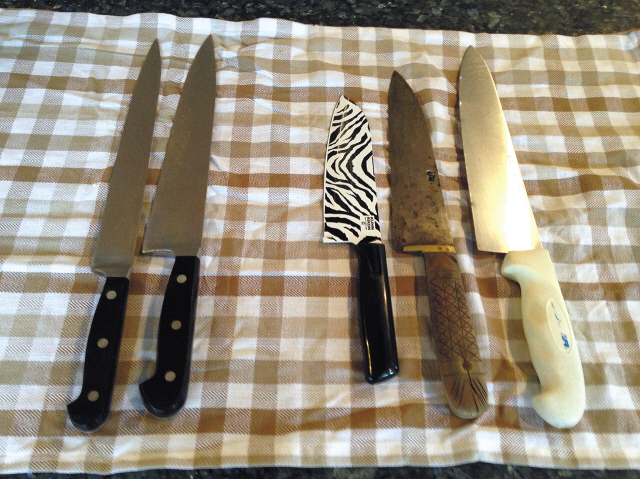I have beautiful kitchen knives. I received my set of hand-forged J.A. Henckels knives on my first day of cooking school 25 years ago, and the instructor told us that if we cared for them properly we would have these knives for life.
I think about that often as I note the knives in their wooden block and think, “Wow, I really have to get these sharpened.”
I don’t use these high-carbon knives, forged from a proprietary mixture of metals that make them very hard and more or less rust-free. When my 10-inch chef’s knife was sharp, it kept a fantastic edge, one that I honed religiously with a hand-held steel.
I can’t remember the last time it was sharp. The Bush administration? It got dull, as knives do, and needed to be resharpened. I tried, with specialty stones, a diamond-dust-crusted stick, an electric sharpener. I could get an edge, but never one that lasted as well as when I took my knives into a shop to get them professionally sharpened.
 |
While high-quality, expensive knives, like those on the left, can last a lifetime, many home cooks find they get by just fine with cheaper ones like those on the right. (Atlanta Journal-Constitution/MCT) |
I would do this more often if I didn’t have other choices stuck in that knife block.
There is a dull gray carbon steel knife with a carved wooden handle that my sister picked up at a bazaar in Iran. It is pitted and discolored from the times I left it wet too long. Once in a while, someone will put it in the dishwasher and it emerges with a coating of bright orange rust that I must scour off.
“Are you sure that’s safe to use?” my wife always asks warily.
This simple knife doesn’t have any chromium in it to keep it stainless or any molybdenum to make it harder. In fact, it gets dull quickly. But all I have to do is hone this soft steel and I can get that edge back pretty quickly.
“You can get a screaming sharp edge on those,” says Matt South, general manager at The Cook’s Warehouse ― East Cobb, Georgia. “As long as you take care of them, wash them and dry them right away, they get kind of crazy looking but stay extremely sharp. My grandmother had knives like that.”
I called up South not just to brag on my Iranian knife, but to lob the devil’s advocate question: Do we really need expensive knives?
“Well, you get a good knife and it will last you for life,” he said. “It will keep an edge for a long time if you are careful to hone it regularly. But you should get it professionally sharpened.”
I’ve heard all this before.
I have the nice knives and never use them.
Know what I use to bone chickens and chop vegetables? A super cheap stamped stainless steel knife with a white plastic handle that I bought at a restaurant supply store. Its days of supreme sharpness are behind it, but I don’t mind whacking a butternut squash with this knife.
I also have a Kuhn Ricon utility knife made of a softer high-carbon steel that had been covered with a zebra striped nonstick coating. It looks like the weapon Cruella de Vil uses to chop off puppy tails. But it keeps a sharp edge that comes back after a swipe or two on the honing steel.
I know that both of these knives eventually will lose their edges enough that I will deem them unusable and push them off to the drawer of unloved kitchen toys.
I can just buy more knives, right? South listens to me, pauses briefly, and says, “Well, think about an iPhone.” An iPhone? “Yes,” he continues. “People get this nice piece of equipment, but then they replace it a year later. The phones are disposable, upgradeable. People treat knives like that. That’s fine. But you could spend a little more money and have knives that will last you for life.”
By John Kessler
(The Atlanta Journal-Constitution)
(MCT Information Services)






![[Exclusive] Hyundai Mobis eyes closer ties with BYD](http://res.heraldm.com/phpwas/restmb_idxmake.php?idx=644&simg=/content/image/2024/11/25/20241125050044_0.jpg)
![[Herald Review] 'Gangnam B-Side' combines social realism with masterful suspense, performance](http://res.heraldm.com/phpwas/restmb_idxmake.php?idx=644&simg=/content/image/2024/11/25/20241125050072_0.jpg)
